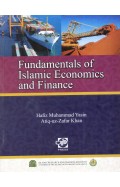Quranic Covenants An Introduction
By: Ahmer Bilal Soofi
-
Rs 2,000.00
Due to constant currency fluctuation, prices are subject to change with or without notice.
The message of the Qur'an has been interpreted through Qur'anic studies or Ulūm al-Qur'ān by many authors over centuries. The legal aspects of the Qur'an have been explored through the jurisprudence of the Sharīʿah or the Uṣūl al-Fiqh, and the moral and ethical code for believers has been researched or ascertained through works often referred to as Aḥkām-e-Qur'an. However, the legal architecture of it being a covenant between a believer and the One Believed in has not been explored as much as it should have been, and experts have acknowledged this as a gap in the existing scholarship. This work is an attempt to start bridging that gap.
The reason why this research is significant is twofold. Firstly, studying the Qur'an is not just a religious endeavor but also a socio-cultural and legal one. The Qur'an is not just a Holy Book for almost two billion people worldwide; it also forms the basis of legal and social systems in many societies. Therefore, understanding its structure and underlying message can offer invaluable insights into these societies and their legal frameworks.
Secondly, while the interpretation of the Qur'an has been the subject of numerous studies, the question of whether there is a fundamental feature underlying its message and whether its structure embodies a unique contractual identity has been less explored. Investigating this aspect can provide a fresh perspective and deepen our understanding of the Qur'an. A believer will find it challenging to resist appreciating how numerous covenants identified in this work bring them in incredible proximity with no less than Allah Himself.
The message of the Qur'an has been interpreted through Qur'anic studies or Ulūm al-Qur'ān by many authors over centuries. The legal aspects of the Qur'an have been explored through the jurisprudence of the Sharīʿah or the Uṣūl al-Fiqh, and the moral and ethical code for believers has been researched or ascertained through works often referred to as Aḥkām-e-Qur'an. However, the legal architecture of it being a covenant between a believer and the One Believed in has not been explored as much as it should have been, and experts have acknowledged this as a gap in the existing scholarship. This work is an attempt to start bridging that gap.
The reason why this research is significant is twofold. Firstly, studying the Qur'an is not just a religious endeavor but also a socio-cultural and legal one. The Qur'an is not just a Holy Book for almost two billion people worldwide; it also forms the basis of legal and social systems in many societies. Therefore, understanding its structure and underlying message can offer invaluable insights into these societies and their legal frameworks.
Secondly, while the interpretation of the Qur'an has been the subject of numerous studies, the question of whether there is a fundamental feature underlying its message and whether its structure embodies a unique contractual identity has been less explored. Investigating this aspect can provide a fresh perspective and deepen our understanding of the Qur'an. A believer will find it challenging to resist appreciating how numerous covenants identified in this work bring them in incredible proximity with no less than Allah Himself.
Zubin Mehta: A Musical Journey (An Authorized Biography)
By: VOID - Bakhtiar K. Dadabhoy
Rs 630.00 Rs 1,050.00 Ex Tax :Rs 630.00
The Art of Statistics: Learning from Data
By: David Spiegelhalter
Rs 2,335.50 Rs 2,595.00 Ex Tax :Rs 2,335.50
Fundamentals Of Islamic Economics And Finance
By: Hafiz Muhammad Yasin
Rs 1,760.00 Rs 2,200.00 Ex Tax :Rs 1,760.00
Surviving Corporate Transition: Rational Management in a World of Mergers
By: William Bridges
Rs 375.00 Rs 500.00 Ex Tax :Rs 375.00
The Quest For Meaning: Developing A Philosophy Of Pluralism
By: Tariq Ramadan
Rs 1,255.50 Rs 1,395.00 Ex Tax :Rs 1,255.50
War of the Worldviews: Science vs Spirituality
By: Dr Deepak Chopra
Rs 895.50 Rs 995.00 Ex Tax :Rs 895.50
In the Shadow of Shari'ah: Islam, Islamic Law and Democracy in Pakistan
By: Matthew J Nelson
Rs 2,605.50 Rs 2,895.00 Ex Tax :Rs 2,605.50
The Messenger: The Meanings of the Life of Muhammad
By: Tariq Ramadan
Rs 2,335.50 Rs 2,595.00 Ex Tax :Rs 2,335.50
The Art of Statistics: Learning from Data
By: David Spiegelhalter
Rs 2,335.50 Rs 2,595.00 Ex Tax :Rs 2,335.50
Fundamentals Of Islamic Economics And Finance
By: Hafiz Muhammad Yasin
Rs 1,760.00 Rs 2,200.00 Ex Tax :Rs 1,760.00
Surviving Corporate Transition: Rational Management in a World of Mergers
By: William Bridges
Rs 375.00 Rs 500.00 Ex Tax :Rs 375.00
No recently viewed books available at the moment.
Zubin Mehta: A Musical Journey (An Authorized Biography)
By: VOID - Bakhtiar K. Dadabhoy
Rs 630.00 Rs 1,050.00 Ex Tax :Rs 630.00
The Art of Statistics: Learning from Data
By: David Spiegelhalter
Rs 2,335.50 Rs 2,595.00 Ex Tax :Rs 2,335.50
Fundamentals Of Islamic Economics And Finance
By: Hafiz Muhammad Yasin
Rs 1,760.00 Rs 2,200.00 Ex Tax :Rs 1,760.00
Surviving Corporate Transition: Rational Management in a World of Mergers
By: William Bridges
Rs 375.00 Rs 500.00 Ex Tax :Rs 375.00












-120x187.jpg?q6)



















